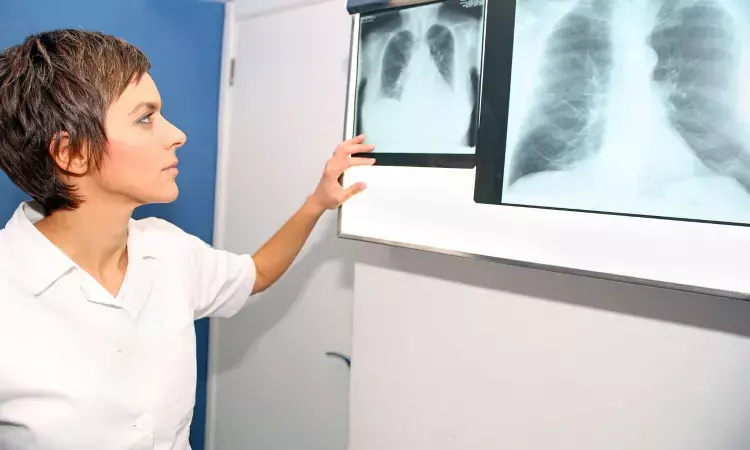- Home
- Medical news & Guidelines
- Anesthesiology
- Cardiology and CTVS
- Critical Care
- Dentistry
- Dermatology
- Diabetes and Endocrinology
- ENT
- Gastroenterology
- Medicine
- Nephrology
- Neurology
- Obstretics-Gynaecology
- Oncology
- Ophthalmology
- Orthopaedics
- Pediatrics-Neonatology
- Psychiatry
- Pulmonology
- Radiology
- Surgery
- Urology
- Laboratory Medicine
- Diet
- Nursing
- Paramedical
- Physiotherapy
- Health news
- Fact Check
- Bone Health Fact Check
- Brain Health Fact Check
- Cancer Related Fact Check
- Child Care Fact Check
- Dental and oral health fact check
- Diabetes and metabolic health fact check
- Diet and Nutrition Fact Check
- Eye and ENT Care Fact Check
- Fitness fact check
- Gut health fact check
- Heart health fact check
- Kidney health fact check
- Medical education fact check
- Men's health fact check
- Respiratory fact check
- Skin and hair care fact check
- Vaccine and Immunization fact check
- Women's health fact check
- AYUSH
- State News
- Andaman and Nicobar Islands
- Andhra Pradesh
- Arunachal Pradesh
- Assam
- Bihar
- Chandigarh
- Chattisgarh
- Dadra and Nagar Haveli
- Daman and Diu
- Delhi
- Goa
- Gujarat
- Haryana
- Himachal Pradesh
- Jammu & Kashmir
- Jharkhand
- Karnataka
- Kerala
- Ladakh
- Lakshadweep
- Madhya Pradesh
- Maharashtra
- Manipur
- Meghalaya
- Mizoram
- Nagaland
- Odisha
- Puducherry
- Punjab
- Rajasthan
- Sikkim
- Tamil Nadu
- Telangana
- Tripura
- Uttar Pradesh
- Uttrakhand
- West Bengal
- Medical Education
- Industry
Patients with persistent dyspnoea after pulmonary embolism likely to benefit from rehabilitation programmes

Norway: A study published in CHEST journal has mentioned that patients experiencing persistent dyspnoea following Pulmonary embolism are likely to benefit from rehabilitation programs.
It is already known that following pulmonary embolism (PE), patients experience persistent dyspnoea, functional limitations and reduced quality of life (QoL). One of the most potent therapeutic options is Rehabilitation, but there remains a lack of scientific evidence.
The question is, does an exercise-based rehabilitation programme improve exercise capacity in such patients?
To research the background mentioned above, researchers conducted a randomized controlled trial at two hospitals. They measured primary (differences in Incremental Shuttle Walk Test (ISWT) and Secondary endpoints (differences in Endurance Shuttle Walk Test (ESWT), QoL (EQ-5D and Pulmonary Embolism-QoL questionnaires) and dyspnoea-related questionnaire.
The summary of the study could be explained as follows:
- There were two groups, Rehabilitation (108 patients) and the control group (103 patients), and patients were randomised in a ratio of 1:1.
- Patients in the rehabilitation programme had two weekly physical exercise sessions for eight weeks and one educational session.
- Patients in the control group received the usual care.
- At follow-up, rehabilitation group participants performed better on the ISWT than the control group, with a mean difference of 53.0 meters.
- The rehabilitation group scored better on the Pulmonary Embolism-QoL questionnaire with a mean difference -of 4% at follow-up.
- Researchers reported no differences in generic QoL, dyspnoea scores, or ESWT.
- No adverse events were reported.
They interpreted the study’s findings as saying following PE, persistent dyspnoea patients receiving Rehabilitation had better exercise capacity at follow-up than the control group.
The study has addressed the importance of Rehabilitation in patients with persistent dyspnoea following PE.
Further investigations are warranted, and more data is required to assess patient selection, timing, mode and duration of Rehabilitation.
Further reading:
The effects of exercise training in patients with persistent dyspnoea after pulmonary embolism: a randomized controlled trial. https://journal.chestnet.org/article/S0012-3692%2823%2900643-8/fulltext
BDS, MDS in Periodontics and Implantology
Dr. Aditi Yadav is a BDS, MDS in Periodontics and Implantology. She has a clinical experience of 5 years as a laser dental surgeon. She also has a Diploma in clinical research and pharmacovigilance and is a Certified data scientist. She is currently working as a content developer in e-health services. Dr. Yadav has a keen interest in Medical Journalism and is actively involved in Medical Research writing.
Dr Kamal Kant Kohli-MBBS, DTCD- a chest specialist with more than 30 years of practice and a flair for writing clinical articles, Dr Kamal Kant Kohli joined Medical Dialogues as a Chief Editor of Medical News. Besides writing articles, as an editor, he proofreads and verifies all the medical content published on Medical Dialogues including those coming from journals, studies,medical conferences,guidelines etc. Email: drkohli@medicaldialogues.in. Contact no. 011-43720751


